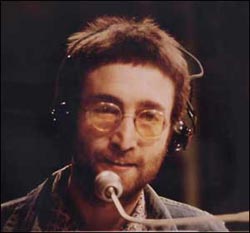

 We live, as the pundits say, in the United States of Amnesia. Even so, did the makers of "The U.S. vs. John Lennon," an inquiry into our government's bizarre attempt to neutralize the perceived political juice of that famed English singer-songwriter, really need to spend half the movie explaining the Vietnam War and the anti-war movement to viewers?
We live, as the pundits say, in the United States of Amnesia. Even so, did the makers of "The U.S. vs. John Lennon," an inquiry into our government's bizarre attempt to neutralize the perceived political juice of that famed English singer-songwriter, really need to spend half the movie explaining the Vietnam War and the anti-war movement to viewers?
If things are really that bad, then perhaps the filmmakers should explain who John Lennon is. After all, the Beatles date back over 40 years.
For those who do remember or are aware of the zeitgeist of the counterculture, this lengthy regurgitation of well-known history mars an otherwise interesting probe into a strange sidebar of the Nixon administration's attempt to suppress those who publicly challenged its failed military and political strategies in Vietnam. For those who do need to be brought up to speed, writer-producer-directors David Leaf and John Scheinfeld throw in too many subjects -- from the rise of the Black Panthers to Watergate -- without sufficient sociopolitical context. A newcomer would indeed get lost.
The guts of the matter, the administration's failed effort to deport Lennon and his wife Yoko Ono -- presumably in the delusional belief that one of the world's most famous individuals would go unnoticed if returned to his native soil -- is fascinating. Especially so in light of our current administration's fetish for spying on Americans without warrants and attempts to silence critics by questioning their patriotism or intestinal fortitude.
The movie starts with a now somewhat obscure figure, John Sinclair, a poet and band manager whose lengthy incarceration in Michigan on marijuana charges triggered a 12-hour concert in December 1971, broadcast throughout the U.S. Lennon appeared along with many other musical acts. The Michigan Supreme Court released Sinclair three days later. This, according the movie's talking heads, alerted the Nixon White House to Lennon's sway over young people, who were now able to vote thanks to the 26th Amendment to the U.S. Constitution.
So the administration hatched the idea of getting Lennon deported on trumped-up charges. The deportation case dragged on for several years. During this time, various government agencies made certain the couple were aware they were being followed and their phones tapped. Little wonder that Ono, in an interview, insists that the pair thought if they went to the 1972 Republican Convention in Miami, they would be "in danger of their lives." She offers no proof of this, however.
A couple of ex-FBI agents agree that the agency under J. Edgar Hoover became a political police force to disrupt and harm those who opposed the war. It falls to the most infamous Nixon official,G. Gordon Liddy, one of the least self-aware individuals ever in political life, to make an even stronger case against the government through his bellicose and belligerent statements against Lennon and the anti-war movement.
Other talking heads include journalists Walter Cronkite and Carl Bernstein, anti-war activist Ron Kovic, novelist Gore Vidal and Democratic presidential candidate George McGovern.
The thing that shines through most clearly, though, is Lennon himself. His widow allowed unprecedented access to the family archives, which along with ample newsreel footage bring us his presence once again. His larkish sense of humor and quick, native intelligence is a breath of fresh air in this age of shrill, strident voices from all segments of the political spectrum. He is dearly missed.
Writer-director-producers: David Leaf, John Scheinfeld; Executive producers: Sandra Stern, Kevin Beggs, Tom Ortenberg, Tim Palen, Nick Meyer, Erik Nelson, Michael Hirschorn, Brad Abramson, Lauren Lazin; Director of photography: James Mathers; Editor: Peter S. Lynch II.